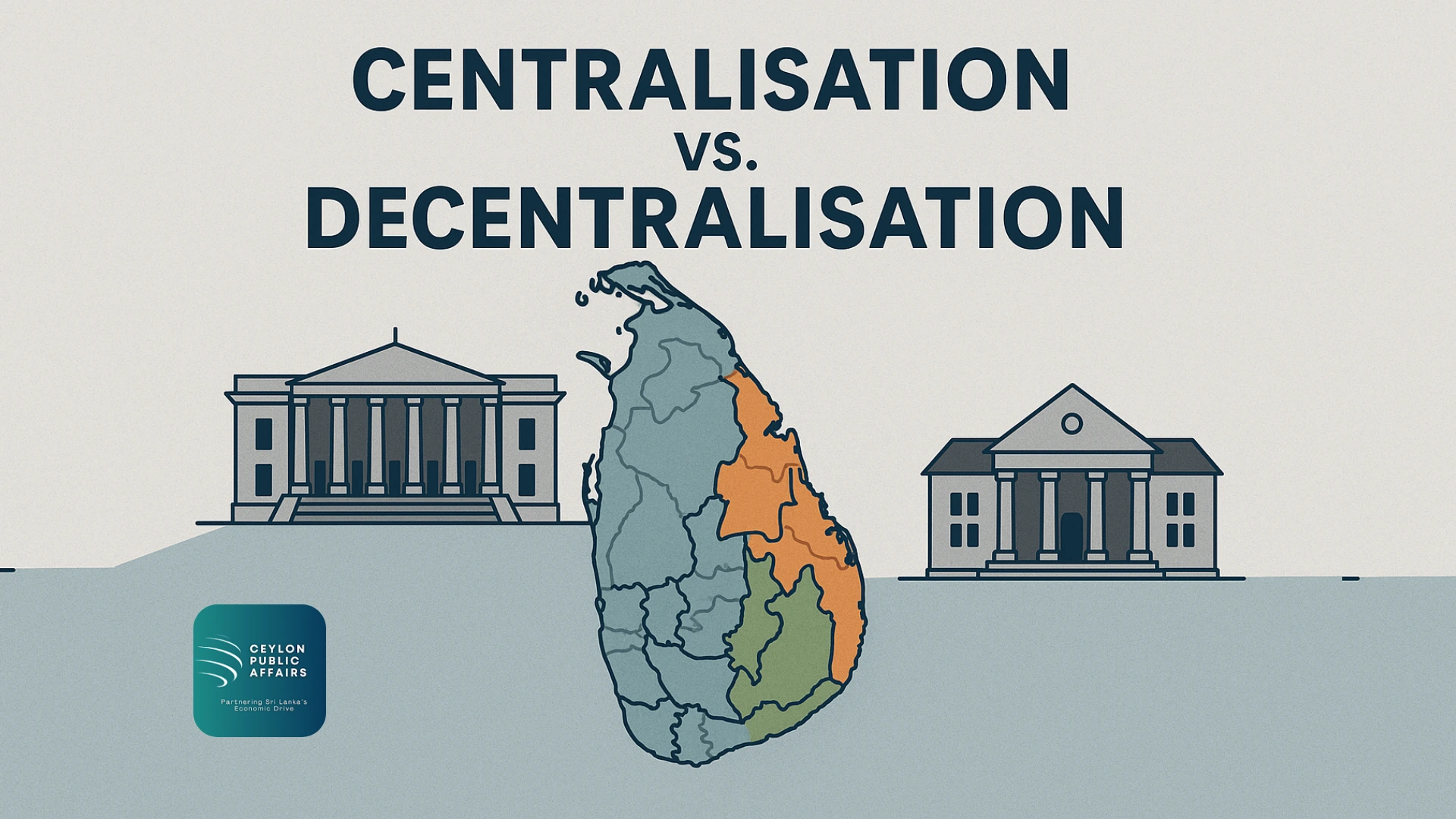Decentralisation vs. Centralisation: Sri Lanka’s Ongoing Debate on Devolution | The balance between central power and local autonomy has shaped Sri Lanka’s politics for decades. From the establishment of Provincial Councils under the 13th Amendment in 1987 to today’s renewed debates on governance reform, questions remain: should Sri Lanka strengthen decentralisation, or return to a more centralised model of government?
Origins of Provincial Councils
Provincial Councils were created as part of the Indo-Lanka Accord, intended to devolve power to provinces and address ethnic conflict. They were constitutionally enshrined through the 13th Amendment, granting provinces authority over areas such as health, education, agriculture, and local administration. In practice, however, their powers have been constrained by central government control, particularly through the role of Governors appointed by the President.
The Case for Decentralisation
Supporters of decentralisation argue that governance closer to the people produces better outcomes. Provincial Councils and local authorities can:
- Improve service delivery by tailoring policies to regional needs.
- Enhance accountability as elected representatives operate at a more local level.
- Reduce ethnic tensions by giving minority provinces greater autonomy and recognition.
- Encourage regional development through policies focused on local economies and infrastructure.
Examples from India, Indonesia, and even within Sri Lanka’s municipal councils show that devolved powers can make governance more responsive.
The Case for Centralisation
Critics highlight inefficiencies, duplication, and political friction. Provincial Councils are often viewed as expensive administrative layers with little real impact. Centralisation advocates argue that:
- Policy uniformity ensures consistency across the island, especially in education and health.
- Fiscal responsibility is better maintained under central control.
- National unity can be strengthened by avoiding fragmented provincial interests.
- Corruption risks are higher with more layers of government.
For many, Provincial Councils represent an external imposition rather than a locally developed institution, raising doubts about their legitimacy.
Current Debate
The conversation has resurfaced with economic reform and political change. Some policymakers propose abolishing Provincial Councils altogether, replacing them with strengthened local government structures. Others push for full implementation of the 13th Amendment, particularly regarding police and land powers, long resisted by successive governments.
Civil society remains divided. Minority groups often see devolution as essential to equity, while others fear it may encourage separatist tendencies. The challenge lies in designing governance structures that both preserve national integrity and deliver local empowerment.
Public Trust and the Path Forward
At the heart of Sri Lanka’s devolution debate lies a deeper question: how do citizens experience governance? Beyond constitutional clauses and administrative models, the success of any reform hinges on public trust earned through transparency, responsiveness, and tangible impact. For decades, Provincial Councils have operated in a liminal space: constitutionally empowered, yet politically constrained.
This ambiguity has bred both skepticism and hope. Communities in the North and East often view devolution as a pathway to dignity and recognition, while others see it as a bureaucratic burden with limited returns. Bridging this divide requires more than structural tweaks; it demands a cultural shift in how power is exercised and shared. Whether through strengthened Councils, reimagined Regional bodies, or empowered municipal authorities, reforms must be rooted in local realities and inclusive dialogue. Citizens must see their voices reflected in decisions, their needs met with urgency, and their identities respected within a unified national framework.
The road ahead is not merely legal; it is emotional, historical, and deeply political. As Sri Lanka reconsiders its governance architecture, the measure of success will be felt not in Colombo’s corridors, but in village councils, urban wards, and everyday lives. Devolution, if done right, can be more than a compromise, it can be a commitment to shared belonging.
What Next?
Sri Lanka faces three broad options:
- Strengthen Provincial Councils by granting them meaningful fiscal and administrative powers.
- Reform into Regional Councils with fewer, larger administrative units to cut costs and streamline governance.
- Abolish Councils and instead empower municipal and local authorities directly, keeping central oversight.
The future of devolution depends not just on constitutional reform but on political will and public trust. Ultimately, the debate is less about structure and more about performance: whichever model delivers better governance, development, and fairness is the one the public will support.
To read about “Freedom of Information in Practice: Is Sri Lanka’s Right to Information Delivering on its Promise?”, Click Here.













